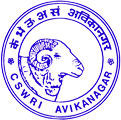BackInstitute develops new sheep breed for better yield
THE TIMES OF INDIA- Jaipur, Dated 24-08-2015
Breaking News:
Central Sheep and Wool Research Institute
JAIPUR: The Central Sheep and Wool Research Institute (CSWRI) in Avikanagar, Tonk have developed a new breed 'prolific sheep' (PS) carrying special modified 'genes' to produce twins and triplets in five months of sheep's gestation period.
The PS has been developed by the integrated cross breeding scheme initiated in 1997 to introgress the 'gene' by using amplified gene specific primers technique in the laboratory.
India's valuable germplasm Garole sheep found in the Sunderbans have been crossbred with Malpura sheep to evolve a large size breed, capable of multiple births for economic and remunerative mutton production in the arid zone. The CSWRI will formally announce the new breed PS in January 2016.
The outcome of research is revolutionary as for every 100 PS, farmers can get 140-150 lambs in one gestation period as compared to 80-90 lambs out of other breeds in one gestation cycle. This prolific sheep weighs 25 kg within six months and fetches Rs 5,000 to Rs 6,000 per unit against Rs 4,000 for normal breeds.
Initially, the result was not up to the mark as it took years of lab work and crossbreeding and reciprocal breeding to come up with right size and better quality of meat. The second challenge, which took years, was to come up with an enhanced quality of milk.
"The Patanwadi sheep was introduced in the gene experiment to increase the milk yield in 2009. This process saw crossbreeding of three breeds - Garole, Maplura and Patanwadi. In 2012 it resulted in the higher prolificacy, higher birth weight along with more milk yield," said A K Shinde, principal scientist, CSWRI.
So far, the institute has produced 1,500 PS in the form of twins and triplets. "We are providing all kind of assistance to the farmers in nearby villages to crossbreed their sheeps with our PS to have twins and triplets in a gestation cycle," said SMK Naqvi, director of CSWRI.
The scientists are hoping that they in coming years will be able to spread the PS in other parts of the country. So far results have proved that PS will improve sheep flock vis-a-vis increase the profitability of sheep production. Later, they will carry out the experiments in other parts of the world.


